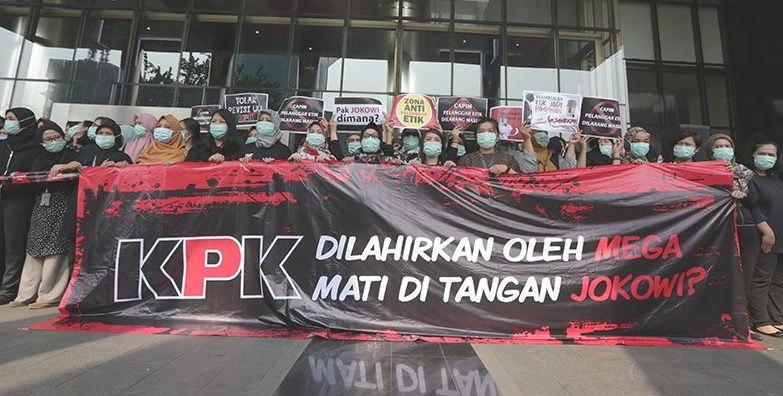Yasonna Laoly, who recently left his post as justice and human rights minister and was sworn in as a member of the House of Parliament (DPR) yesterday, has urged President Joko Widodo to not use his executive power to block the implementation of a highly controversial law that critics say would cripple the graft-busting abilities of the Corruption Eradication Commission (KPK).
A bill, known as RUU KPK, was passed into law on September 17 — just 13 days after it was first officially tabled for deliberation at the DPR. Critics say RUU KPK contains nine seriously problematic issues that would prevent the agency from fulfilling its mission, such as the creation of an “oversight council” to monitor KPK’s performance, removing its independent status by making it a government body, requiring KPK investigators to obtain permits from the oversight council to conduct wiretaps, and the removal of the KPK’s ability to recruit its own investigators.
There have been loud calls since for Jokowi to issue a Perppu (government regulation in lieu of law) against RUU KPK, which would temporarily block its implementation and put the burden back on DPR to either make the Perppu permanent or reject it during their next legislative session.
Jokowi initially resisted those calls, prompting even greater criticism against the president from anti-corruption activists. However, last Thursday, amid nationwide student protests — who demanded that RUU KPK be blocked among other demands — Jokowi announced he was now considering issuing the requested Perppu after all, following feedback from various parties. The president did not specify when he would make his decision but his telegraphing of the move suggests the Perppu is forthcoming.
Yasonna, who Jokowi picked to represent the government in deliberations of RUU KPK when he was still minister, today voiced his strong rejection of the Perppu.
“[RUU KPK] was intended to improve KPK’s governance,” he said at the Parliament compound in Jakarta today, as quoted by Kompas.
“Don’t make pressuring [the government] part of our culture. Let it go. We should go about this constitutionally.
“There’s no need for [a Perppu] yet. We’ll see, if [KPK’s performance] is not perfect, then we’ll do a legislative review. The law hasn’t been implemented and we’re already prejudiced.”
Should Jokowi decide against issuing the Perppu (which is still a likely outcome since pretty much all factions in DPR are in favor of RUU KPK), anti-corruption activists and civil society groups have said that they were prepared to challenge the revised law at the Constitutional Court.




